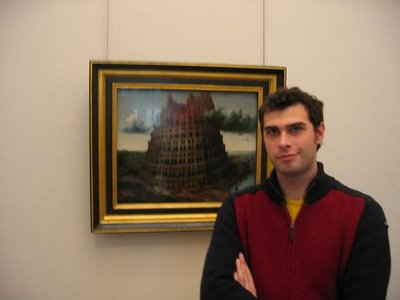from the 'hypocritical oaths' dept:
Gay Sailor challenges ‘Don't Ask, Don't Tell'
Groton Democrats May Help Support His Efforts
By Bethe Dufresne, New London Day, 31 Jan 06
Groton -- A seaman apprentice at the Naval Submarine School launched a personal campaign for gay rights Monday, first by telling his commanding officer that he was gay, then by issuing a news release to the media.
“I am an American, I am a United States sailor, I am a brother, son and friend to many. I also happen to be gay,” wrote 19-year-old Seaman Apprentice John Graff, who said he wants to stay in the Navy as an openly gay man.
That is not an option for Graff, however, since he violated the Pentagon's “Don't Ask, Don't Tell” policy on homosexuality by declaring that he's gay. Facing discharge, he now plans to focus on trying to repeal the federal DADT policy enacted in 1994, and may have found an ally in the Groton Demo-cratic Town Committee.
Last Thursday, Graff went before the town committee seeking support. Vice Chairman Karen Buffkin said the committee invited Graff to submit a written resolution which, if approved, might be sent to U.S. Rep. Rob Simmons, R-2nd District, a member of the Armed Services Committee.
While the DADT policy is a federal issue, Buffkin saw plenty of reason for local people to get involved.
“The sub base is part of our constituency,” she said, “and a lot of servicemen and women live in Groton.”
Democratic Town Chairman Elizabeth K. Moukawsher wasn't at Thursday's meeting, but had met Graff earlier during committee caucuses.
Graff wanted to join the committee, an elected position, but couldn't because he was in the military, Moukawsher said. She said repealing DADT is “a good issue for Democrats,” especially because they differ sharply from Republicans.
Christopher N. Zendan, public affairs officer for the submarine base, confirmed that Graff met Monday with his commanding officer, Capt. Kenneth Swan, on a personal matter. The meeting was a Request Mast, said Zendan, meaning it was not the result of any disciplinary action.
“Captain Swan was very respectful, and I appreciated that,” said Graff, who lives on the base.
Graff enlisted in the Navy in June 2005, and has been at the Naval Submarine School since August. He said he grew up in the Bronx and Poughkeepsie, N.Y., and prior to enlistment worked on Democratic political campaigns, including Democratic Party Chairman Howard Dean's bid for the presidential nomination.
Given his background, Graff said he expected some would think he joined the Navy just so he could make a statement. But he claimed he had dreamed of a military career since childhood.
“Serving your country in the military is something great,” he said. “Every American should have the opportunity to do it.”
For awhile after enlisting, Graff said, the thrill of being in the Navy was enough. But listening to friends talk about their girlfriends, he said, made him resent not being allowed to be honest about his sexuality, especially when honesty was a major military virtue.
Graff said the DADT policy mistakenly assumes that an openly gay man or woman could make peers uncomfortable due to the “special circumstances” of military service.
“When I first told my peers, individually, they all said the same exact thing, that ‘it doesn't matter; it doesn't change the way I feel about you,' ” Graff said. “I have a feeling it's the old guard, for the most part, who care about this, not the younger service people.”
Graff said he asked Swan to “show your dedication to our Constitution and our great nation by standing beside your shipmate and allowing me to serve my country as God created me; as an openly gay man.”
But he had no illusions that his request would be granted.
Zendan said it's not up to individual officers to decide whether to accept openly gay servicemen and women. Once a declaration is made, policy dictates that discharge proceedings must begin, Zendan said.
In February 2005, the U.S. Department of Defense reported that military discharges based on DADT made up a small fraction of “unprogrammed separations,” and were at their lowest level since 1996. The report cited 9,500 discharges from 1994 through fiscal 2003, but said numbers had consistently dropped.
In 2003, there were 770 discharges under the DADT policy, compared to 1,227 in 2001.
Español | Deutsche | Français | Italiano | Português| Ch| Jp| Ko







0 Comments: